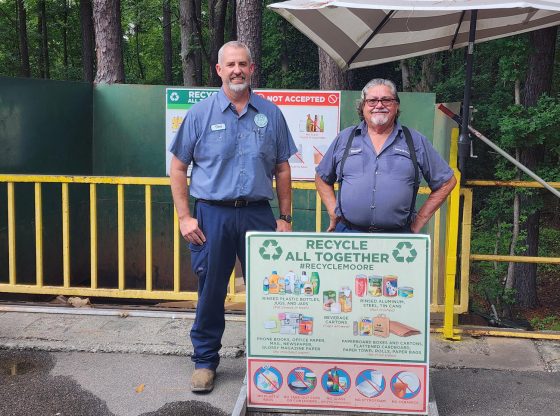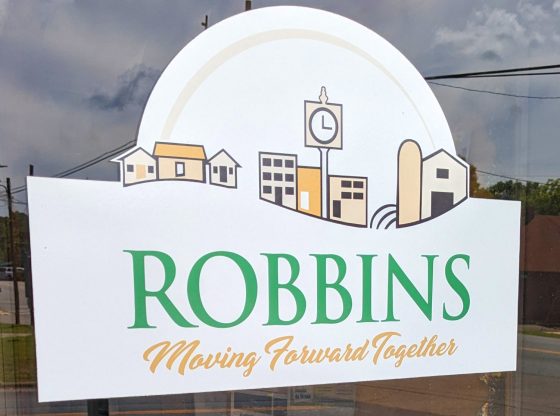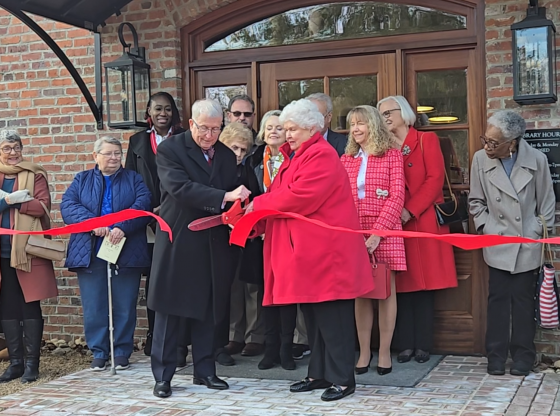Recycling may seem simple, but in Moore County, it’s a well-coordinated effort that goes far beyond tossing bottles into a bin. The Moore County Solid Waste division works day in and day out to ensure that recyclable materials find their way from curbside bins to repurposed products.
“I believe we offer a great recycling program,” said Steve Perkins, assistant director of property management for Moore County. “We give all our residents the opportunity to recycle.”
Steve’s role in Solid Waste is integral in ensuring the county’s recycling operations run smoothly. Moreover, Steve and his team make it their mission to educate the Sandhills about the process of recycling and its benefits.
Steve explained that recycling in Moore County operates “like a funnel.” Recycling starts with the consumer, and the first and most important step is for residents to understand what items can be recycled and where to take them.
Moore County residents have the option to recycle through curbside collection offered by individual towns or by utilizing one of the county’s seven convenience sites. These sites accept a surprising range of materials, some that Steve feels many people may not expect.
“We accept a variety of recyclable materials, including all types of paper, newspapers, magazines, catalogs, office paper, books, corrugated cardboard, and mail,” listed Steve. “Additionally, we accept LDPE film, PET and steel banding, pallets, plastic containers (No.1-7 as well as other types of plastics), aluminum cans, and steel cans.”
The county offers a “commingle” recycling program at the convenience sites, where plastics, paper, cardboard, and tin cans are placed into a single container for processing, which reduces both waste from landfills and any hassle in sorting materials for the consumer.
Each Moore County city collects its own curbside recycling, and these mixed recyclables are then sent to Pratt Industries in Fayetteville, a materials recovery facility that sorts and processes the materials for reuse.
However, not all materials can be recycled. Steve noted that items like Styrofoam, contaminated potting soil containers, and shredded paper should not be placed in recycling bins.
Styrofoam is a common mistake, often found mixed with cardboard boxes, which leads to delays as it must be separated by Solid Waste staff. Residents should also be mindful to thoroughly clean recyclables, such as detergent bottles, before disposing of them, as any residue can contaminate the recycling process.
In addition to Pratt Industries, the county works with other vendors, such as Strategic Materials, which handles glass recycling, and Southern Environmental Solutions, which deals with electronic waste. For plastic films like grocery bags, Perkins recommends taking them to participating grocery stores, where special collection bins are available.
In the end, though, Steve and his team know that education is key. “It’s largely a personal decision,” explained Steve, acknowledging that participation varies among residents. “Some customers are devoted to it, while others don’t want to be bothered.”
With around 40 employees dedicated to managing the county’s solid waste operations, including the Moore County Landfill, Steve and his team continue to improve recycling efforts and educate the community. “Educating people the best you can” is key to making recycling a regular part of daily life. While the Solid Waste Department provides the tools, success ultimately depends on individual responsibility.
For more information on what can be recycled and where to dispose of items, residents can visit the Moore County website at www.moorecountync.gov.
Feature photo: Tim Garner, Solid Waste collections supervisor and Michael Jordan, Hillcrest site attendant. Photo provided by Moore County Solid Waste.
~Article by Sandhills Sentinel Assistant Editor Abegail Murphy and intern Andrew Sellers.



















